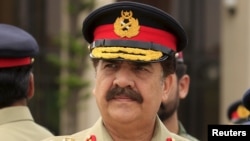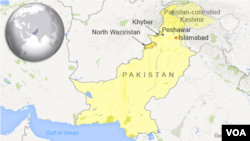Pakistan’s military chief General Raheel Sharif is to begin a crucial five-day visit to the United States on Monday. Officials say that “pressing issues” such as regional counterterrorism and Afghan peace efforts will top the agenda of the meetings with top American officials.
General Sharif is scheduled to meet with his U.S. military counterparts and the director of the CIA. The two sides are expected to review security and anti-terrorism cooperation.
The general is also scheduled to hold important talks with Vice President Joe Biden, Secretary of State John Kerry and Defense Secretary Ash Carter, says a senior Pakistani official with knowledge of the agenda.
Counterterrorism efforts
He told VOA requesting anonymity that General Sharif will brief U.S. leaders on successes of counterterrorism military operations to secure the volatile northwestern region, which borders Afghanistan.
The anti-insurgency offensive, dubbed as Zarb-e-Azb, was launched nearly 18 months ago in the militant-dominated semiautonomous North Waziristan tribal district and has since been expanded to other parts of Pakistan.
Military officials say that more than 3,500 local and foreign extremists have been killed while hundreds of security personnel also have lost lives. The anti-insurgency activity, say Pakistani leaders, has led to a significant decline in terrorist attacks in the country.
The official says the Pakistani military leader will re-emphasize the need for effective border controls on the Afghan side of the porous frontier and call for choking external terrorist financing.
General Sharif’s visit comes at a time of intensified international and regional push for restoration of a stalled peace and reconciliation process in Afghanistan to end the Taliban-led insurgency there.
Pakistan's role in peace talks
Pakistan’s role is seen as critical to bring the insurgents to the peace table because of its past ties to the Islamist group that Afghan officials allege remain intact.
The senior Pakistani official acknowledged that “there is a clear possibility for a new push for resumption of the [Afghan] reconciliation process.”
Without giving further details, he said General Sharif would urge U.S. interlocutors to ensure that “any resumed peace effort” would not be scuttled by “elements” within the Afghan government.
The United States and China have called on Afghan and Pakistani leaders to join hands to encourage insurgent leaders to come to the peace table, anticipating a lowering of winter Afghan fighting.
Pakistani Senator Mushahid Hussain, chairman of the defense affairs committee of the upper house of parliament, calls for furthering the Afghan peace process from where it was broken in July.
“I am quite upbeat and optimistic about the situation. This new convergence between Pakistan, China and the United States on promoting and pushing forward an Afghan peace process is a positive development and, we hope that it will have positive results too,” he told VOA.
Past talks
Pakistan in July mediated and hosted the first round of peace negotiations between Afghan government and Taliban officials.
But the process was disrupted on the eve of a scheduled second crucial round days later when it was revealed that longtime Taliban chief Mullah Omar had died two years ago.
Pakistani officials indirectly blame the Afghan intelligence agency for disclosing the news to disrupt the peace talks, insisting the institution is opposed to the reconciliation process.
Afghan President Ashraf Ghani had been under fire from his political opponents and even members within his own government for allowing Islamabad to play a role in the process.
The spike in insurgent attacks in Afghanistan since the dialogue collapsed has added domestic pressure on the Afghan leadership not to seek further help from the neighboring country amid growing allegations that Islamabad is behind the violence.
An Afghan presidential spokesman, Zafar Hashemi, would not say whether Islamabad’s role would be welcomed in any future peace parleys with the Taliban.
“We want Pakistan to take action against those groups inside its territory that commit terrorism against our people, and hold gatherings in public, declaring war against Afghans. Taking actions against those groups in itself can be Pakistan's cooperation in the Afghan peace process,” Hashemi told VOA.
Pakistani officials deny charges the Taliban is receiving any support or being allowed to use this side of the border for insurgent activities in Afghanistan.





